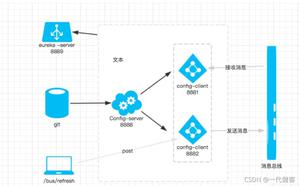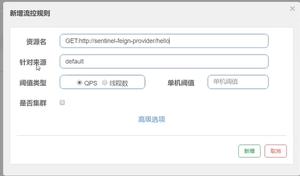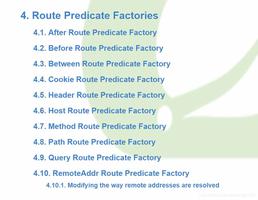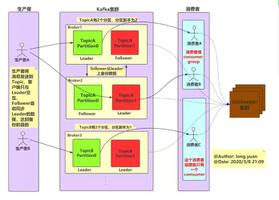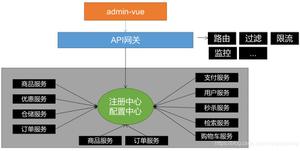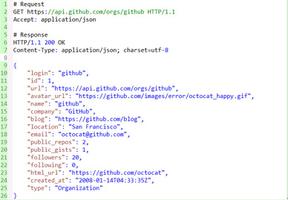3、SpringCloud从看不懂到放弃,第二章

SpringCloud从看不懂到放弃,第二章
一、Eureka服务的注册与发现
Eureka
Netflix在设计Eureka时遵守的就是AP原则CAP原则又称CAP定理,指的是在一个分布式系统中,Consistency(一致性)、 Availability(可用性)、Partition tolerance(分区容错性),三者不可兼得
1、Eureka简介
Eureka是Netflix的一个子模块,是一个基于Rest的服务,用于服务定位,已实现云端中间层服务发现和故障转移。 服务注册与发现对于微服务架构来说是非常重要的,有了服务发现与注册,只需要使用服务的标识符,就可以访问到服务,而不需要修改服务调用的配置文件了。
功能类似于dubbo的注册中心,比如zookeeper
Eureka基本架构
Spring Cloud 封装了 Netflix 公司开发的 Eureka 模块来实现服务注册和发现(请对比Zookeeper)。 Eureka 采用了 C-S 的设计架构。Eureka Server 作为服务注册功能的服务器,它是服务注册中心。
而系统中的其他微服务,使用 Eureka 的客户端连接到 Eureka Server并维持心跳连接。这样系统的维护人员就可以通过 Eureka Server 来监控系统中各个微服务是否正常运行。SpringCloud 的一些其他模块(比如Zuul)就可以通过 Eureka Server 来发现系统中的其他微服务,并执行相关的逻辑。
Eureka包含两个组件:Eureka Server和Eureka Client
Eureka Server提供服务注册服务
各个节点启动后,会在EurekaServer中进行注册,这样EurekaServer中的服务注册表中将会存储所有可用服务节点的信息,服务节点的信息可以在界面中直观的看到
EurekaClient是一个Java客户端,用于简化Eureka Server的交互,客户端同时也具备一个内置的、使用轮询(round-robin)负载算法的负载均衡器。在应用启动后,将会向Eureka Server发送心跳(默认周期为30秒)。如果Eureka Server在多个心跳周期内没有接收到某个节点的心跳,EurekaServer将会从服务注册表中把这个服务节点移除(默认90秒)
三大结构
1、Eureka server提供服务注册与发现2、service provide将自身服务注册到Eureka,从而使服务消费方能够找到
3、service consumer从Eureka获取注册服务列表,从而能够消费服务
2、构建项目
项目结构
总父工程通用模块API
服务提供者Provider
服务消费者Consumer
eureka服务注册中心module
(1)、cloud-eureka-7001
POM
主要包含一个spring-cloud-starter-eureka-server
<?xml version="1.0" encoding="UTF-8"?><project xmlns="http://maven.apache.org/POM/4.0.0"
xmlns:xsi="http://www.w3.org/2001/XMLSchema-instance"
xsi:schemaLocation="http://maven.apache.org/POM/4.0.0 http://maven.apache.org/xsd/maven-4.0.0.xsd">
<parent>
<artifactId>cloud</artifactId>
<groupId>com.lee</groupId>
<version>1.0-SNAPSHOT</version>
</parent>
<modelVersion>4.0.0</modelVersion>
<artifactId>cloud-eureka-7001</artifactId>
<dependencies>
<!--eureka-server服务端 -->
<groupId>org.springframework.cloud</groupId>
<artifactId>spring-cloud-starter-eureka</artifactId>
</dependency>
<!-- 修改后立即生效,热部署 -->
<dependency>
<groupId>org.springframework</groupId>
<artifactId>springloaded</artifactId>
</dependency>
<dependency>
<groupId>org.springframework.boot</groupId>
<artifactId>spring-boot-devtools</artifactId>
</dependency>
</dependencies>
</project>
注意:
基本上我们要引入cloud的一个新的技术组件,会有两步1、新增一个相关的maven坐标
<dependency>
<groupId>org.springframework.cloud</groupId>
<artifactId>spring-cloud-starter-eureka-server</artifactId>
</dependency>
2、在主启动类上标注启动该新组件的相关注解标签
@EnableEurekaServer
@EnableZuulProxy
@EnableXXXXX
...
APPLICATION.YML
主要暴露eureka端口和对外服务地址
server: port: 7001
eureka:
instance:
hostname: localhost #eureka服务端的实例名称
client:
register-with-eureka: false #false表示不向注册中心注册自己。
fetch-registry: false #false表示自己端就是注册中心,我的职责就是维护服务实例,并不需要去检索服务
service-url:
defaultZone: http://${eureka.instance.hostname}:${server.port}/eureka/ #设置与Eureka Server交互的地址查询服务和注册服务都需要依赖这个地址。
主启动类
package com.lee.cloud;import org.springframework.boot.SpringApplication;
import org.springframework.boot.autoconfigure.SpringBootApplication;
import org.springframework.cloud.netflix.eureka.server.EnableEurekaServer;
//EurekaServer服务器端启动类,接受其它微服务注册进来
@EnableEurekaServer
@SpringBootApplication
public class EurekaServer7001_App {
public static void main(String[] args) {
SpringApplication.run(EurekaServer7001_App.class,args);
}
}
测试
http://localhost:7001(2)、将已有的部门微服务注册进Eureka服务中心
修改cloud-provider-dept-8001
POM - 新增 eureka客户端 config配置中心
<!-- 将微服务provider侧注册进eureka --><dependency>
<groupId>org.springframework.cloud</groupId>
<artifactId>spring-cloud-starter-eureka</artifactId>
</dependency>
<dependency>
<groupId>org.springframework.cloud</groupId>
<artifactId>spring-cloud-starter-config</artifactId>
</dependency>
<!--注意:-->
<!--
如果eureka下载不下来的话
改成这个
<dependency>
<groupId>org.springframework.cloud</groupId>
<artifactId>spring-cloud-starter-eureka</artifactId>
<version>1.3.6.RELEASE</version>
</dependency>
-->
YML - 新增 eureka服务地址
eureka: client: #客户端注册进eureka服务列表内
service-url:
defaultZone: http://localhost:7001/eureka
主启动类 - 新增 将本服务启动后自动注册进eureka服务中
@EnableEurekaClient //本服务启动后会自动注册进eureka服务中测试:
1、启动 cloud-eureka-70012、启动 cloud-provider-dept-8001
3、http://localhost:7001
注意:暴露在eureka中的微服务名称,即provider的yml中spring:application:name的名称
如果找不到服务的话,大概率是应为spring-cloud-starter-eureka和
<groupId>org.springframework.cloud</groupId>
<artifactId>spring-cloud-dependencies</artifactId>
<version>Dalston.SR1</version>
版本不一致导致的
(3)、actuator与注册微服务信息完善---主机映射名称修改
Eureka服务中的显示
Application AMIs Availability Zones Status
CLOUD-DEPT
n/a (1)
(1)
UP (1) - windows10.microdone.cn:cloud-dept:8001
目标:修改 windows10.microdone.cn:cloud-dept:8001的显示
cloud-provider-dept-8001修改:
YML
eureka: instance:
instance-id: cloud-dept8001
结果:
Application AMIs Availability Zones Status
CLOUD-DEPT
n/a (1)
(1)
UP (1) - cloud-dept8001
(4)、actuator与注册微服务信息完善---主机IP信息提示
鼠标移动到上侧超链接时,浏览器左下角的链接显示
cloud-provider-dept-8001修改:
YML
eureka: instance:
prefer-ip-address: true #访问路径可以显示IP地址
(5)、actuator与注册微服务信息完善---Info内容构建
cloud-dept8001超了解点击后内容的构建
cloud-provider-dept-8001修改:
POM
<dependency> <groupId>org.springframework.boot</groupId>
<artifactId>spring-boot-starter-actuator</artifactId>
</dependency>
YML
info: #内容以info开头下边随便写 app.name: cloud
author.name: lee
app.function: 部门服务提供者
build.artifactId: $project.artifactId$
build.version: $project.version$
CLOUD父工程POM
<build><!--构建--> <finalName>microservicecloud</finalName>
<resources> <!--可以访问src/main/resources下的文件-->
<resource>
<directory>src/main/resources</directory>
<filtering>true</filtering>
</resource>
</resources>
<plugins>
<plugin>
<groupId>org.apache.maven.plugins</groupId>
<artifactId>maven-resources-plugin</artifactId>
<configuration>
<delimiters>
<delimit>$</delimit>
</delimiters>
</configuration>
</plugin>
</plugins>
</build>
结果:
访问:http://192.168.101.39:8001/info显示:
{"app":
{
"name":"cloud",
"function":"部门服务提供者"
},
"author":{"name":"lee"},
"build":{
"artifactId":"$project.artifactId$",
"version":"$project.version$"
}
}
3、Eureka集群配置
(1)、仿照cloud-eureka-7001创建cloud-eureka-7002和cloud-eureka-7003
(2)、修改 映射
c:WindowsSystem32driversetc下的host文件添加如下:
127.0.0.1 eureka7001.com
127.0.0.1 eureka7002.com
127.0.0.1 eureka7003.com
(3)、三台eureka服务的yml配置
eureka: instance:
hostname: eureka7001.com ##eureka服务端的实例名称,知识localhost换了个名而已
eureka:
client:
defaultZone: http://eureka7002.com:7002/eureka,http://eureka7003.com:7003/eureka
##也可以是http://localhost:7002/eureka,http://localhost:7003/eureka
(4)、cloud-provider-dept-8001 YML服务地址修改
eureka: client:
service-url:
defaultZone: http://eureka7001.com:7001/eureka,http://eureka7002.com:7002/eureka,http://eureka7003.com:7003/eureka
测试:
http://eureka7001.com:7001http://eureka7002.com:7002
http://eureka7003.com:7003
4、Eureka自我保护机制
某时刻某一个微服务不可用了,或者长时间没有被调用,eureka不会立刻清理,依旧会对该微服务的信息进行保存。(网络拥堵或者调用超时) 什么是自我保护模式?
默认情况下,如果EurekaServer在一定时间内没有接收到某个微服务实例的心跳,EurekaServer将会注销该实例(默认90秒)。但是当网络分区故障发生时,微服务与EurekaServer之间无法正常通信,以上行为可能变得非常危险了——因为微服务本身其实是健康的,此时本不应该注销这个微服务。Eureka通过“自我保护模式”来解决这个问题——当EurekaServer节点在短时间内丢失过多客户端时(可能发生了网络分区故障),那么这个节点就会进入自我保护模式。一旦进入该模式,EurekaServer就会保护服务注册表中的信息,不再删除服务注册表中的数据(也就是不会注销任何微服务)。当网络故障恢复后,该Eureka Server节点会自动退出自我保护模式。
在自我保护模式中,Eureka Server会保护服务注册表中的信息,不再注销任何服务实例。当它收到的心跳数重新恢复到阈值以上时,该Eureka Server节点就会自动退出自我保护模式。它的设计哲学就是宁可保留错误的服务注册信息,也不盲目注销任何可能健康的服务实例。一句话讲解:好死不如赖活着
综上,自我保护模式是一种应对网络异常的安全保护措施。它的架构哲学是宁可同时保留所有微服务(健康的微服务和不健康的微服务都会保留),也不盲目注销任何健康的微服务。使用自我保护模式,可以让Eureka集群更加的健壮、稳定。
5、Eureka和Zookeeper对比
RDBS(mysql/oracle/sqlserver)---->ACIDNOSQL(redis/mongodb)----->CAP
---------------------------------------------------------
---------------------------------------------------------
ACID: atomicity原子性、
consistency一致性、
isolation独立性、
durability持久性
CAP: consistency强一致性、
availability高可用、
partition tolerance 分区容错性
---------------------------------------------------------
---------------------------------------------------------
Eureka遵守AP Zookeeper遵守CP
作为服务注册中心,Eureka比Zookeeper好在哪里
著名的CAP理论指出,一个分布式系统不可能同时满足C(一致性)、A(可用性)和P(分区容错性)。由于分区容错性P在是分布式系统中必须要保证的,因此我们只能在A和C之间进行权衡。
因此
Zookeeper保证的是CP,
Eureka则是AP。
1. Zookeeper保证CP
当向注册中心查询服务列表时,我们可以容忍注册中心返回的是几分钟以前的注册信息,但不能接受服务直接down掉不可用。也就是说,服务注册功能对可用性的要求要高于一致性。但是zk会出现这样一种情况,当master节点因为网络故障与其他节点失去联系时,剩余节点会重新进行leader选举。问题在于,选举leader的时间太长,30 ~ 120s, 且选举期间整个zk集群都是不可用的,这就导致在选举期间注册服务瘫痪。在云部署的环境下,因网络问题使得zk集群失去master节点是较大概率会发生的事,虽然服务能够最终恢复,但是漫长的选举时间导致的注册长期不可用是不能容忍的。
2. Eureka保证AP
Eureka看明白了这一点,因此在设计时就优先保证可用性。Eureka各个节点都是平等的,几个节点挂掉不会影响正常节点的工作,剩余的节点依然可以提供注册和查询服务。而Eureka的客户端在向某个Eureka注册或时如果发现连接失败,则会自动切换至其它节点,只要有一台Eureka还在,就能保证注册服务可用(保证可用性),只不过查到的信息可能不是最新的(不保证强一致性)。除此之外,Eureka还有一种自我保护机制,如果在15分钟内超过85%的节点都没有正常的心跳,那么Eureka就认为客户端与注册中心出现了网络故障,此时会出现以下几种情况:
2.1、Eureka不再从注册列表中移除因为长时间没收到心跳而应该过期的服务
2.2、Eureka仍然能够接受新服务的注册和查询请求,但是不会被同步到其它节点上(即保证当前节点依然可用)
2.3、当网络稳定时,当前实例新的注册信息会被同步到其它节点中
因此, Eureka可以很好的应对因网络故障导致部分节点失去联系的情况,而不会像zookeeper那样使整个注册服务瘫痪。
拓展知识
#服务发现@AutoWire
private DiscoveryClient client;
List<String> serviceList = client.getServices();//列出Eureka中所有的服务
List<ServiceInstance> instanceList = client.getInstances("CLOUD-DEPT");//查找服务实例
instance.getServiceId();//实例ID
instance.getHost();//实例主机
instance.getPort();//实例端口
instance.getUri();//实例Uri
@EnableDiscoveryClient //主启动类上+服务发现注解
以上是 3、SpringCloud从看不懂到放弃,第二章 的全部内容, 来源链接: utcz.com/z/510296.html

